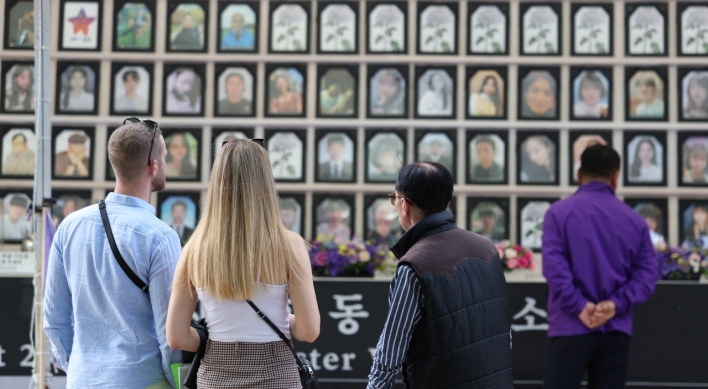아스타나(카자흐스탄) =아소 다로 일본 부총리 겸 재무상이 언제든 한ㆍ중 장관과 회담을 개최할 가능성을 열어두고 있다고 밝혔다. 그는 “경제는 살아있는 동물과 같다”며 만일 아시아 권내에서 긴박한 상황이 발생, 상호간 협력이 필요하다면 “우리는 언제든 대화 요청에 응할 것” 이라고 말했다.
이번 발언은 당초 4일 현오석 부총리 겸 기획재정부 장관의 주도로 열릴 예정이었던 한ㆍ중ㆍ일 재무장관 회의가 취소된 것에 따른 것이다. 현 부총리는 세월호 참사 등 여러 가지 국내 사정을 감안해 해외 일정을 취소한 것으로 알려졌다. 현 부총리는 지난해 인도에서 열린 ADB(아시아개발은행) 연차총회 겸 ASEAN+3 재무장관•중앙은행 총재 회의에도 불참했다.
아소 부총리는 현부총리 불참으로 인해 이번 회의가 갖는 의미가 축소된 것에 대한 질문에는 답변 하지 않았다. 다만 이번 불참이 “한국의 세월호 사태로 긴박한 상황조치를 위해 어쩔 수 없었던 것으로 이해하고 있다”고 말했다.
한편, 한중일 및 ASEAN+3 회원국은 이날 회의를 통해 선진국들을 중심으로 세계경제가 회복세에 접어들었으나, 미국의 양적 완화 축소, 중국의 성장 둔화 등이 역내 경제의 불안요소로 작용할 수 있다고 의견을 모았다.
불안요소를 줄이기 위해 달러유동성 지원을 위한 다자간 통화스왑체제인 ‘치앙마이 이니셔티브 다자화공동기구(Chiang Mai Initiative Multilateralization)’의 기능을 한층 강화하고 국제통화기구(IMF)와의 협업도 강화하기로 결정했다. 또 이를 위해 우리나라 주도로 ‘CMIM-IMF간 협력에 대한 가이드라인’을 마련하기로 합의했다.
우리나라에선 이주열 한국은행 총재와 은성수 기획재정부 국제경제관리관이 이번 회의에 참석했다.
이번 발언은 당초 4일 현오석 부총리 겸 기획재정부 장관의 주도로 열릴 예정이었던 한ㆍ중ㆍ일 재무장관 회의가 취소된 것에 따른 것이다. 현 부총리는 세월호 참사 등 여러 가지 국내 사정을 감안해 해외 일정을 취소한 것으로 알려졌다. 현 부총리는 지난해 인도에서 열린 ADB(아시아개발은행) 연차총회 겸 ASEAN+3 재무장관•중앙은행 총재 회의에도 불참했다.
아소 부총리는 현부총리 불참으로 인해 이번 회의가 갖는 의미가 축소된 것에 대한 질문에는 답변 하지 않았다. 다만 이번 불참이 “한국의 세월호 사태로 긴박한 상황조치를 위해 어쩔 수 없었던 것으로 이해하고 있다”고 말했다.
한편, 한중일 및 ASEAN+3 회원국은 이날 회의를 통해 선진국들을 중심으로 세계경제가 회복세에 접어들었으나, 미국의 양적 완화 축소, 중국의 성장 둔화 등이 역내 경제의 불안요소로 작용할 수 있다고 의견을 모았다.
불안요소를 줄이기 위해 달러유동성 지원을 위한 다자간 통화스왑체제인 ‘치앙마이 이니셔티브 다자화공동기구(Chiang Mai Initiative Multilateralization)’의 기능을 한층 강화하고 국제통화기구(IMF)와의 협업도 강화하기로 결정했다. 또 이를 위해 우리나라 주도로 ‘CMIM-IMF간 협력에 대한 가이드라인’을 마련하기로 합의했다.
우리나라에선 이주열 한국은행 총재와 은성수 기획재정부 국제경제관리관이 이번 회의에 참석했다.

코리아헤럴드 오규욱 기자 (596story@heraldcorp.com)
<관련 영문 기사>
Asia agrees to enhance currency swap
ASTANA, Kazakhstan -- Top financial officials from East Asia agreed last week to further strengthen a multilateral currency swap scheme in an effort to boost the region’s “financial safety net.”
Finance ministers and central bank governors from the 10-member Association of Southeast Asian Nations, as well as South Korea, Japan, and China will continue to develop and expand the so-called Chiang Mai Initiative Multilateralization.
“We reaffirm our commitment to further strengthen the CMIM as part of the regional financial safety net,” officials said in a statement after the Asian Development Bank’s annual meeting in Astana.
The CMIM, whose reserves to buffer Asia against future short-term liquidity fallout currently stand at $240 billion, was devised in the aftermath of the Asian financial crisis in the late 1990s.
Asia’s recommitment to developing a resilient regional financial market came amid growing concerns over the U.S. Federal Reserve’s bond-buying tapering, geopolitical risks related to Ukraine and China’s slow growth.
They said in the communique that Asia needed to remain “vigilant” against potential global risks and vulnerabilities.
The leaders, however, pointed out that the global economy recovered in the first quarter of this year, driven by steady growth in advanced economies.
The officials agreed to further strengthen ASEAN Plus Three Macroeconomic Research Office, or AMRO, which it set up in 2011 to provide economic and financial surveillance, and help countries manage the CMIM.
They will endorse a set of guidelines for further cooperation with the International Monetary Fund to “help enhance CMIM’s effectiveness and AMRO’s capacity,” according to the statement.
Meanwhile, financial leaders of Korea, Japan and China failed to hold a trilateral meeting for the second consecutive year, due in part to the absence of Korea’s Deputy Prime Minister and Finance Minister Hyun Oh-seok.
“We understand that because of the ferry disaster an emergency response has to be made,” Taro Aso, Japan’s finance minister and deputy prime minister, who cochaired the ASEAN Plus Three meeting, said at a news conference.
He said he was always open to having a separate meeting with his Korean and Chinese counterparts.
“The economy is a living animal. If something urgent happens (in the region) I’m willing to meet the Korean finance minister or Chinese minister,” he added.
By Oh Kyu-wook
(596story@heraldcorp.com)










![[New faces of Assembly] Architect behind ‘audacious initiative’ believes in denuclearized North Korea](http://res.heraldm.com/phpwas/restmb_idxmake.php?idx=644&simg=/content/image/2024/05/01/20240501050627_0.jpg&u=20240502093000)
![[Music in drama] Rekindle a love that slipped through your fingers](http://res.heraldm.com/phpwas/restmb_idxmake.php?idx=644&simg=/content/image/2024/05/01/20240501050484_0.jpg&u=20240501151646)






